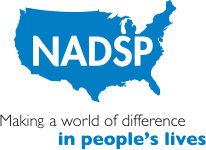
Bringing Sensitivity To Direct Support
The following article is part of an ongoing series about the NADSP Competency Areas. The NADSP Competency Areas offer DSPs the opportunity to address challenges, work on issues identified by the person they support, or assist a person in pursuing a particular goal. Each Competency Area has corresponding skill statements that describe the knowledge and skills DSPs must have to demonstrate competency in each area.
This blog is about the skill statement “The competent DSP incorporates sensitivity to cultural, religious, racial, disability, and gender issues into daily practices and interactions,” within the NADSP Competency Area: “Organizational Participation.”
Inside The Competency Area
Organizational Participation
The NADSP Competency Area ‘Organizational Participation’ is described as “the direct support professional is familiar with the mission and practices of the support organization and participates in the life of the organization. “Life of the organization.” This is a complex statement. The “life” of an organization is observed in the culture and activities that are present on a daily basis. These can be the way an organization celebrates holidays, the types of decorations and artwork that is seen in all agency environments, the dress code (if there is one), and a multitude of other cultural signatures.
One specific focus of Organizational Participation, as it serves as a competency for direct support professionals, is associated specifically with deeper individual cultural issues in the workplace: things like race, religion, disability, etc., and how the direct support professional responds inclusively and equitably to these aspects of the organizational participants and members.
The competent DSP incorporates sensitivity to cultural, religious, racial, disability, and gender issues into daily practices and interactions.
Inside The Skill Statement
The competent DSP incorporates sensitivity to cultural, religious, racial, disability, and gender issues into daily practices and interactions.
A competent DSP consistently demonstrates sensitivity and awareness regarding cultural, religious, racial, disability, and gender issues in all aspects of their work. They actively respect the diverse backgrounds, identities, and beliefs of the individuals they support, while ensuring that every person is treated with dignity, fairness, and compassion. They listen attentively, communicate respectfully, and adapt services to align with each individual’s unique preferences and values.
A competent and reflective direct support professional will challenge their own biases, seek ongoing education about diversity and inclusion, and always advocate for equity in service delivery in situations when that is at risk. In all aspects of their work – providing personal care, facilitating community involvement, or supporting daily living activities – the direct support professional must be mindful and culturally aware. Such an inclusive approach generates trust, empowerment, and a safe environment for all individuals.
The Impact On People Receiving Services
Cultural sensitivity ensures that people with disabilities are seen, heard, and respected as individuals with diverse identities, values, and experiences. When direct support professionals approach their work through a culturally sensitive lens, they acknowledge that intellectual and developmental disability intersects with race, ethnicity, language, religion, gender, and socioeconomic background. This can lead to more personalized and respectful support, where services are tailored to the person’s full identity and not only their disability.
Culturally sensitive environments help eliminate stereotypes, reduce stigma, and promote dignity and self-determination. Understanding and working to create spaces where people with disabilities feel understood and valued can only serve to create safe and happy organizational cultures.
Improving communication, trust, and overall quality of life can be facilitated by direct support professionals who integrate this part of the competency, Organizational Participation, in their daily practice. When cultural beliefs and personal preferences are honored, individuals are more likely to engage meaningfully in their communities, access needed resources, and live fuller, more empowered lives.
Putting It All Into Practice
Demonstrating sensitivity and awareness to cultural, religious, racial, and gender issues, as employees in an organization, involves intentional actions, self-awareness, and a commitment to inclusivity. Direct support professionals need to educate themselves continuously. DSPs should take initiative to learn about different cultures, religions, identities, and experiences. If they are offered by your employer, DSPs should attend training sessions and get updated on inclusive workplace practices.
DSPs must always practice active listening and be empathetic. Try to listen to other people without judgment. Show interest in other people and their perspectives and experiences. Empathy helps build trust and connection.
It is so important to use inclusive language. Be mindful of words and phrases that you speak or communicate. Do your best to avoid assumptions about gender, family structure, or other cultural differences. Show respect by using correct and people’s preferred pronouns.
Sometimes you may need to challenge bias or prejudice. When you feel that someone you support or another coworker is receiving unfair treatment, address it constructively and/or report it appropriately. Silence can reinforce harm and is your sign of complicity in harmful action.
DSPs have a great opportunity to celebrate diversity every day. You can very easily acknowledge and respect cultural and religious holidays, traditions, and practices. Participating in or supporting events that honor diversity can promote an inclusive environment.
We all have unconscious biases. Regularly reflect on how your beliefs may impact your behavior and be open to feedback. Work with your supervisor and your co-workers and talk about things that come up that may be associated with challenges you face or questions that arise about discrimination, racism, or other situations.
Finally, advocate for and follow agency/employer policies that promote fairness, representation, and inclusion and access for all.
Quick Tips
How can you help embrace this skill statement and implement it? Here are some quick tips!
-
- Celebrate diversity – Take part in celebrations, events, and functions that promote diversity, equity, and inclusion
- Reflect on your own biases and be sure to “know thyself” and things that may impact how you treat others
- Learn about the histories of oppressed populations and understand your role as a DSP is one of civil rights advocate
- Have conversations with your team and supervisors that focus on how you can promote cultural awareness
- Note the month of the year, and if it is a specific month like Pride Month, Developmental Disabilities Awareness Month, Mental Health Awareness month … celebrate!
Relevant Resources
- Diversity, Equity and Inclusion Resources (EBSCO)
- Proud & Supported Project (NYS Developmental Disabilities Planning Council)
- Sexuality and Gender Identity (Impact)
- Embracing Diversity (Frontline Initiative)
- The Diverse Voices of DSPs (Frontline Initiative)
- U.S. Equal Employment Opportunity Commission
NADSP Competency Areas
The NADSP Competency Areas offer DSPs the opportunity to address challenges, work on issues identified by the person they support, or assist someone in pursuing a goal.
You May Also Be Interested In …

Let’s Talk: Beyond Companionship: How Dogs Support People To Thrive

Let’s Talk: The Art of Connection: Establishing and Repairing Rapport in Direct Support Settings

Let’s Talk: Summertime and The Living Should Be Easy: Supporting People with Significant Intellectual and Developmental Disabilities in Summer Activities

Let’s Talk: Embracing Diversity Equity and Inclusion: A Pathway to Professional Excellence for DSPs

Let’s Talk: Burnout: Reclaiming Mental Wellness in Direct Support Work

Let’s Talk: Flipping the Switch: Compassion Fatigue to Compassion Satisfaction and Psychological Safety for Direct Support Professionals

Let’s Talk: Sexuality and Healthy Relationship Knowledge is Power

Let’s Talk: Balancing Joy, Boundaries, and Belonging: The Ethical Role of DSPs in Holiday Celebration and Connection

Webinar: The Future of COVID-19 and Vaccines

